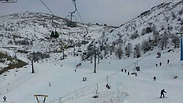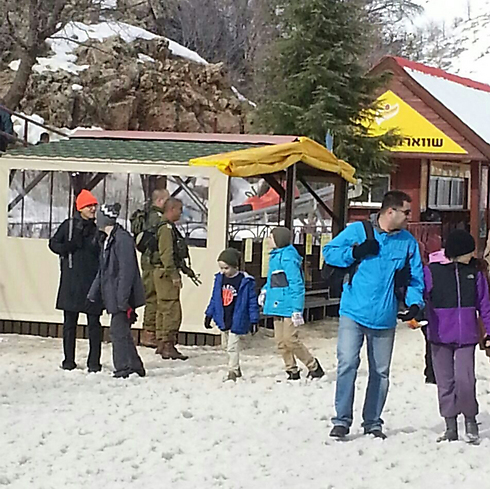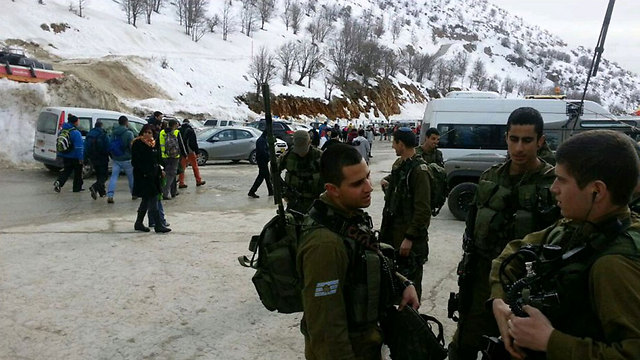
Two rockets fired from Syria at Israel, IDF returns fire
Army fires 20 artillery shells at Syrian positions from which rockets launched at northern Golan originated; no injuries or damages reported on Israeli side.
At least two rockets from Syria hit the northern Golan Heights on Tuesday and IDF returned fire, nine days after an Israeli air strike in Syria killed an Iranian general and several Lebanese Hezbollah fighters.
The IDF said it fired 20 artillery shells at Syrian positions from which the rockets originated. The rockets hit open areas and no injuries or damages were reported.
Residents in Druze villages near the border reported to hearing several explosions, shortly after a Code Red rocket alert siren was sounded near the border.
The IDF has instructed the evacuation of some 1,000 visitors from the Hermon Mountain ski site, and the resort has been closed until further notice.
Officials at the Hermon ski site said the rockets fell in several places in the Golan Heights. "Following this, the IDF instructed to evacuate the visitors from the Hermon site ... the IDF is also at the scene," they said.

Residents in the Maron Golan area were asked to remain close to safe rooms and shelters and farmers in the area were instructed to evacuate. Israel Police briefly blocked all roads leading to the Golan Heights, and has since re-opened all but the ones leading to the Hermon.
Fighting in neighboring Syria's civil war has spilled over to Israel in the past. Mortar shells have exploded sporadically inside Israeli territory since the conflict began, sometimes causing minor damage. Israel believes most fire is errant shots but has at times accused Syria of aiming at Israeli targets. Israeli troops have returned fire on several occasions.
This time, however, "it does not seem that it was errant fire," Lieutenant-Colonel Peter Lerner, an IDF spokesman, told Reuters.
Hezbollah's Al-Manar TV network reported that Israel Air Force planes were circling over the Israel-Syria border at Quneitra on the Israeli side.
The IDF raised its alert level on the northern front last Monday in positions along the border with Syrian and Lebanon and deployed an Iron Dome rocket interceptor battery near the northern border, after a strike attributed to Israel killed senior Hezbollah officers and an Iranian general nine days ago. Both Hezbollah, which is backed by Iran and fought a 34-day war with Israel in 2006, and the Revolutionary Guards vowed to avenge the deaths.
On Sunday, a number of roads were closed amid a possible security incident along Israel's northern border. Shortly afterwards the roads were reopened, indicating that if there was an event it had come to an end.
Senior security sources in Lebanon who are affiliated with Hezbollah recently said that the attack, in which Iranian general Mohammad Ali Allahdadi and the son of master terrorist Imad Mughniyah were killed, "shows that Israel has crossed the red line in the security war with Hezbollah, which means the rules have changed."
This is an ongoing event, updates are forthcoming.
Yoav Zitun, Ahiya Raved, Michal Margalit, Reuters, AP contributed to this report.












